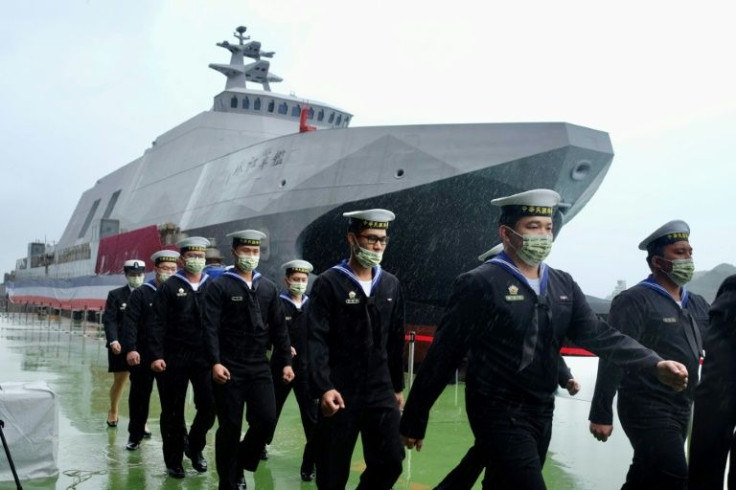US, Taiwan Suspect China Of Taking Advantage Of Ukraine Crisis

China is fully aware of the fact that the U.S. cannot handle the two-front confrontations with both China and Russia simultaneously and go unscathed.
The communist regime believes that the U.S. Indo-Pacific goal and the NATO expansion to the Russian border are too big to achieve when put together to act simultaneously.
The U.S. believes that China is gauging the U.S. response to the Ukraine crisis as a proxy for how it would respond to aggressive action by China against Taiwan, which it claims as its own.
While the U.S. and its NATO allies are engaged in a diplomatic standoff over Ukraine with Russia, it has taken the heat off China on many issues like the origin of COVID-19, sanctions against Chinese telecommunications giant Huawei, alleged genocide against the Uyghur Muslims, curtailing freedom in Hong Kong and atrocities against religions minorities like the Tibetan Buddhists.
But the U.S. will not let China have its way without a fight when it comes to Taiwan, its straw to clutch at to tame a rising China.
No wonder U.S. Secretary of State Antony Blinken made his presence felt by attending the QUAD in Australia last week despite surging Russia-Ukraine tension. Blinken along with the foreign ministers of India, Japan, and Australia emphasized that the U.S. prefers to stick to Asia policies in which containment of China forms an integral part and won't be deterred even by the prospect of war in the European continent.
Unification of Taiwan with the mainland has figured prominently in the Chinese scheme of things. From former Chairman Mao Zedong to President Xi Jinping, the Taiwan unification has been a matter of time for the Chinese leadership.
The renegade self-governed island, bolstered by sophisticated arms sales from the U.S., is now seen by the U.S. as Beijing's next target, a contention that China has rejected.
To boost the Chinese morale, there have been some cracks in US-European unity, with leading nations like Germany standing in the way of starting a full-fledged war against Russia due to economic reasons. China hopes European leaders will follow suit when it comes to a stand-off with the second-largest economy in the world.
The U.S. is firm on the view that China may act anytime against Taiwan and has devoted enough time to the QUAD bloc of the U.S., India, Japan, and Australia and has created the Aukus, a nuclear partnership of the U.S., U.K., and Australia, aimed at China.
Recently, the U.S. approved the sale of as many as 36 new F-15 fighter jets to Indonesia, bolstering ties with another key partner in the region.
The South Pacific has become a vital region for the Biden administration in its Indo-Pacific strategy. Blinken met with 18 Pacific Island leaders on Feb. 12 during a virtual meeting and announced the U.S. plans to speed up the process to open an embassy in the South Pacific nation of Solomon Islands to counter China's influence in the politically troubled Pacific Islands.
In Fiji, an important port-of-call for the U.S. Navy plying the Pacific, where the top U.S. diplomat visited Feb. 12, Blinken promised more investment. It is for the first time in 37 years a U.S. Secretary of State had visited Fiji.
Taiwan is also leaving no stones unturned. Taiwan's presidential office said that the military has strengthened its surveillance operations due to the Ukraine crisis.
"All military units continue to pay close attention to the situation in Ukraine and movements in the Taiwan Strait, continue to strengthen joint intelligence and surveillance, and gradually increase the level of combat readiness in response to various signs and threats to effectively respond to various situations," the presidential office said in a statement.
Of late, Taiwan has charged China's air force with flying into its air defense zone. Last month, Taiwan reported the largest incursion since October by China's air force, involving at least 39 aircraft.
Taiwan President Tsai Ing-wen has put in place a working group under the National Security Council to watch developments in Ukraine and the possible impact on Taiwan's security.
The ever-closer ties between China and Putin's Russia are fueling concerns within the White House.
While the U.S. has typically lumped Russia and China together as threats to its national security, they are actually polls apart in their international conduct.
Unlike Russia, China has taken full advantage of globalization, has contributed to UN peacekeeping and tourism, scholarly and scientific exchanges, and overseas investments, notably with the U.S.
To achieve its objective, Russia banks heavily on military power to impose its will, and China uses soft power: the Belt-and-Road Initiative, Confucius Institutes, sporting events, communication programs, and money-backed public diplomacy.
But when it comes to backing China on international issues, from human rights to Taiwan, the Chinese leadership has always counted on Putin's Russia. Though the reverse is generally true.
China and Russia are aligned with one another in terming the U.S. as their principal challenger to achieve their respective aims in Asia and Europe.
They are divided by many issues, including, unresolved territorial claims, their large gap in economy and technology and China did not support Russia's seizure of Crimea in 2014.
Their mutual admiration for each other conceals more than it reveals.





